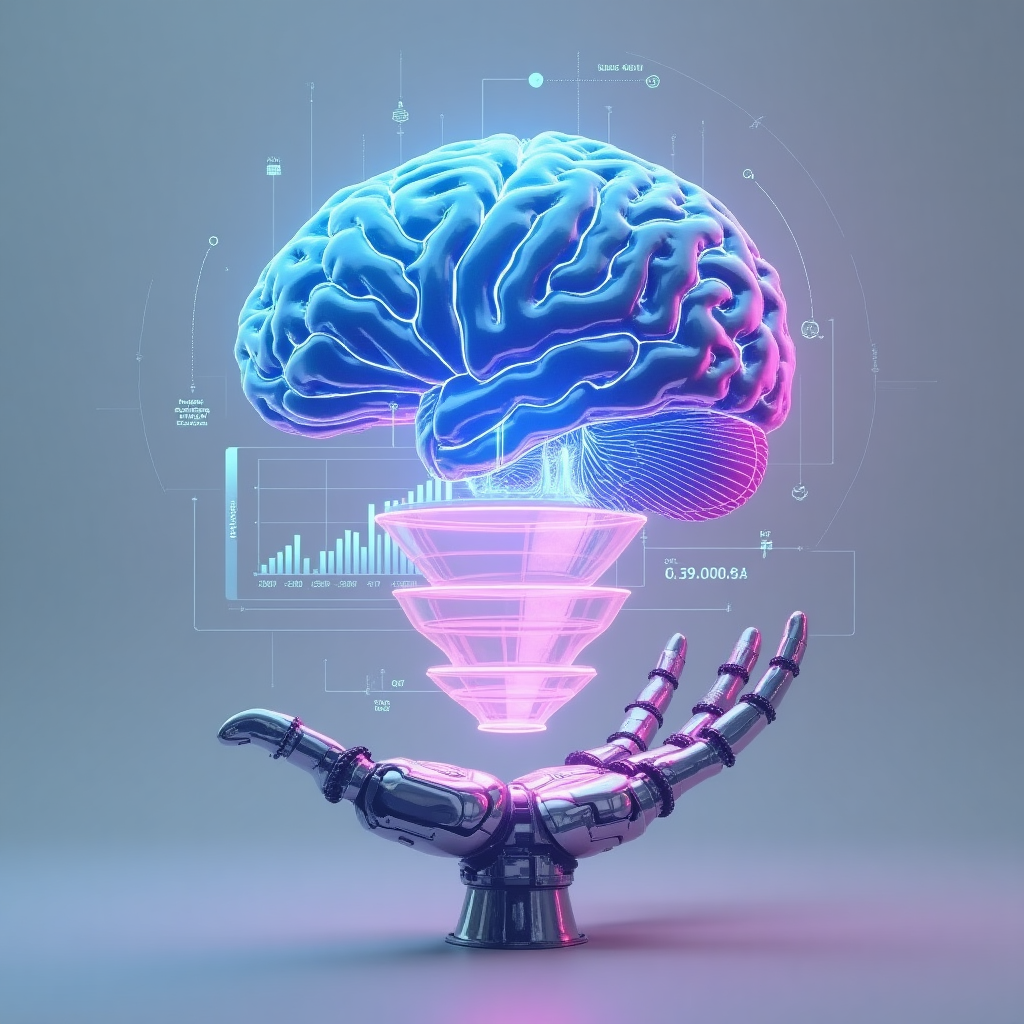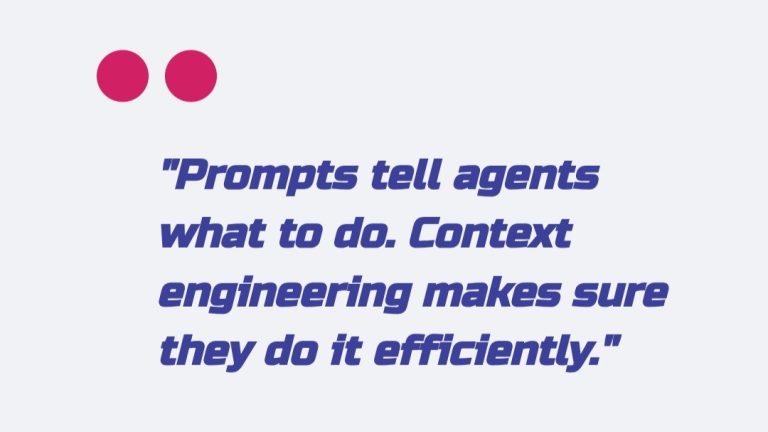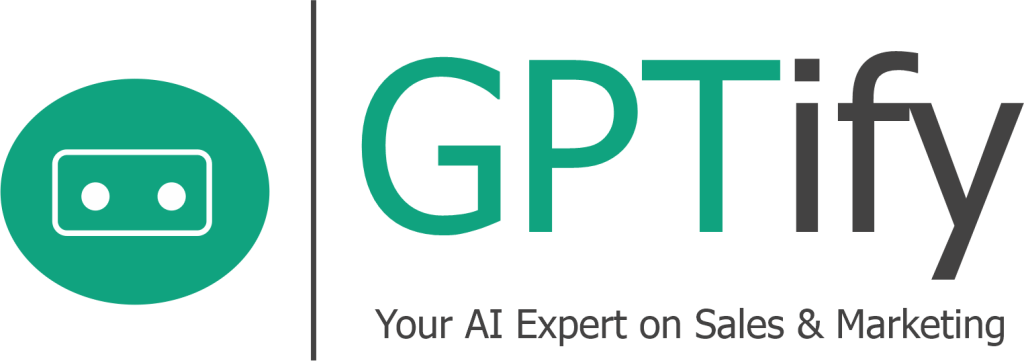Marketing has always been about understanding the customer. But in 2025, AI used in marketing doesn’t just understand them—it predicts them, speaks their language, creates content they’ll engage with, and optimizes every touchpoint. According to Salesforce, 84% of marketers say AI has improved their campaign performance. AI isn’t replacing marketers; it’s evolving them.
Let’s explore the real innovation happening behind the buzzword.
Hyper-Personalization at Scale
AI allows businesses to deliver individual experiences to millions—without the manpower. By analyzing user behavior, location, previous interactions, and even device type, marketers can now show each customer the right message, at the right time, on the right channel. According to Digital Marketing Institute, personalization improves marketing ROI by over 20%.
Example: Netflix uses AI to personalize thumbnails based on your viewing behavior—this boosts click-through rates significantly.
Predictive Analytics for Campaign Optimization
One of the most powerful aspects of AI in marketing is its predictive capabilities. AI systems assess thousands of variables in real-time—from weather to stock levels—to recommend the best strategy. Tools like IBM Watson Marketing can forecast customer behavior based on historical trends and intent signals.
This is especially useful in customer churn prediction, seasonal campaigns, and product launches.
AI-Powered Content Creation
Generative AI (like GPT and diffusion models) can now write high-quality product descriptions, social posts, email subject lines, and even full blog articles. At scale.
Brands like Chase Bank reportedly saw better conversion rates from AI-generated copy versus human copy.
Platforms like Cubeo AI allow marketing teams to train and deploy their own no-code AI content agents that create assets based on their unique voice and customer personas—no code, no lag.

Smart Segmentation
Gone are the days of static customer segments. AI can dynamically update customer groups based on micro-behaviors. This means you can target “users who have clicked a blue CTA button twice in the past week after seeing product X” instantly.
Conversational Marketing with AI
Chatbots today aren’t glorified FAQs. With NLP and sentiment analysis, tools like Drift, Intercom, and Cubeo AI Assistants are driving personalized conversations. Some even close sales or set appointments.
According to SurveyMonkey, businesses using conversational AI saw a 67% increase in lead qualification speed.
Real-Time Dynamic Pricing
Retailers like Amazon have long used dynamic pricing. Today, even mid-sized businesses are leveraging AI to adjust prices based on supply, demand, user behavior, and competitor pricing. Think hotel bookings, travel, and ecommerce.
The result? More revenue and better margins.
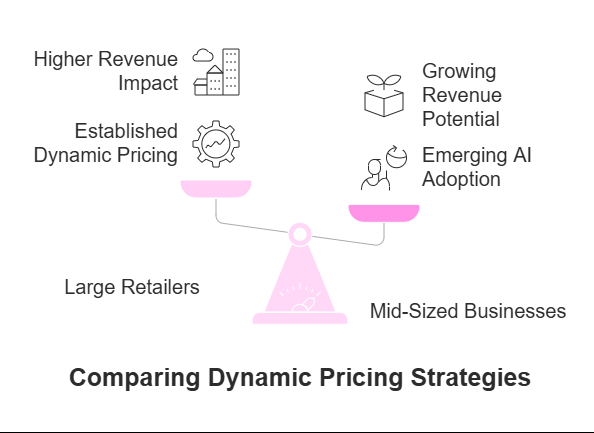
Sentiment Analysis and Brand Monitoring
Tools like Brand24 or Talkwalker use AI to comb through millions of mentions and gauge customer sentiment. This allows brands to respond quickly to crises—or double down on viral moments.
Brands like Nike and Spotify actively monitor social sentiment before launching major campaigns.
Automated A/B Testing
Why test two landing pages over a week when AI can test 100 combinations in a day?
AI tests headlines, colors, formats, and even emotional triggers in real-time. And it keeps learning—no more waiting weeks for results.
AI in Email Marketing
From the best time to send to the optimal subject line length, AI transforms email campaigns. Tools like Mailchimp’s Smart Send Time or ActiveCampaign’s automation rules harness AI to improve deliverability and engagement.
Voice Search Optimization
As more users use Siri, Alexa, or Google Assistant, optimizing for voice search becomes crucial. AI helps tailor content that answers spoken queries conversationally. A must for local businesses and service-based industries.
Zero-Party Data Strategies with AI
With third-party cookies fading, marketers must now collect data voluntarily (zero-party data). AI-powered quizzes, surveys, and chat flows can encourage customers to share preferences—building trust and personalization simultaneously.
Ethical Considerations in AI Marketing
Bias in AI is real. Marketers must ensure datasets are diverse, algorithms are explainable, and transparency is part of their strategy.
Following ethical AI principles is no longer optional—it’s good business.
Case Studies of AI in Action
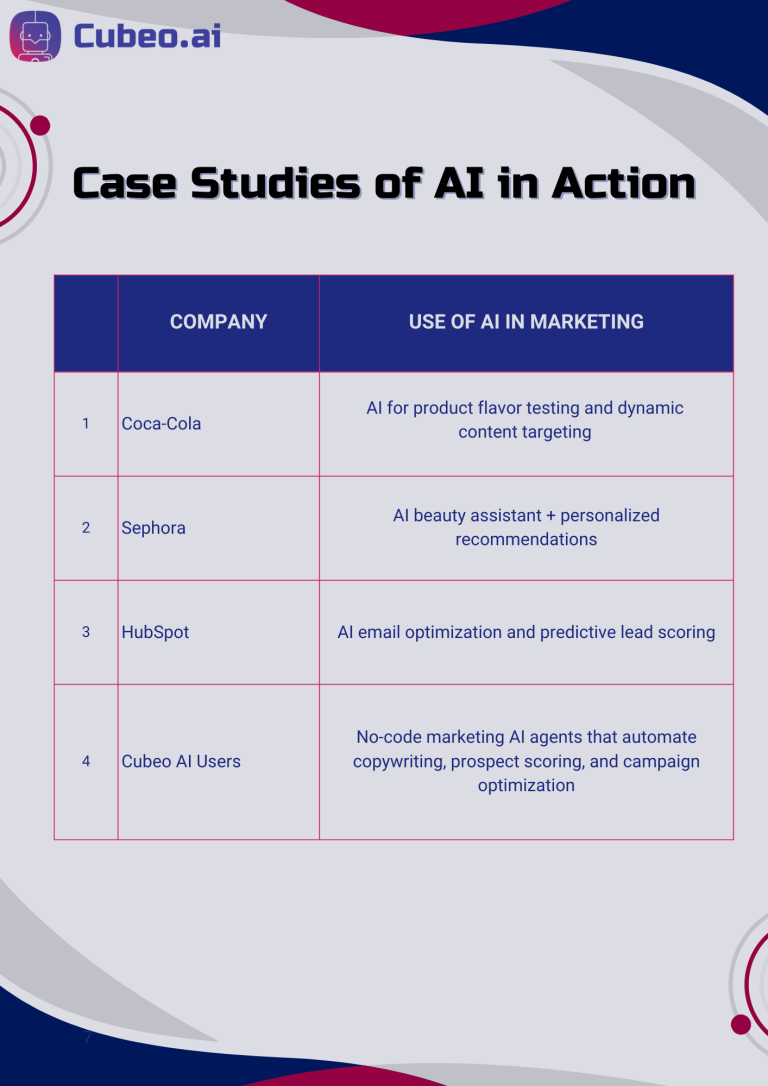
AI-Powered Influencer Marketing
AI now matches influencers with brands based on engagement rates, audience authenticity, and values—not just follower count. This ensures better ROI and alignment.
Tools like Upfluence or CreatorIQ use AI to drive data-led collaborations.
Video Marketing Powered by AI
AI tools like Synthesia or Pictory automate video creation, editing, and even personalization. Imagine sending a product explainer that says the recipient’s name.
Marketers report up to 3x higher engagement with personalized video.
Future Trends in AI Marketing
- Autonomous AI campaigns
- Digital twins of customer segments
- Voice + visual search fusion
- AI-generated 3D content for AR/VR
FAQs
AI marketing refers to using artificial intelligence tools and techniques to enhance marketing tasks like personalization, segmentation, content creation, and decision-making.
- Can small businesses use AI in marketing?
Yes, especially with no-code platforms like Cubeo AI that lower technical barriers and allow SMEs to deploy advanced tools affordably.
- Is AI marketing expensive?
Not necessarily. Costs vary by tool, but many offer scalable options. Long-term, it reduces spend on inefficient campaigns.
- How does AI help in customer retention?
By predicting churn, personalizing offers, and maintaining ongoing engagement through chatbots and emails.
- Does AI replace marketers?
No. It enhances their capabilities by removing repetitive work and offering smarter insights.
- What’s the biggest benefit of AI in marketing?
Improved ROI through real-time optimization, better customer targeting, and scalable personalization.
Conclusion
AI used in marketing is no longer a luxury—it’s the new baseline. From content to conversions, AI is redefining how we connect with customers. Platforms like Cubeo AI democratize these capabilities, making them accessible, ethical, and effective. Whether you’re a global brand or a growing startup, it’s time to automate smarter and market better.
